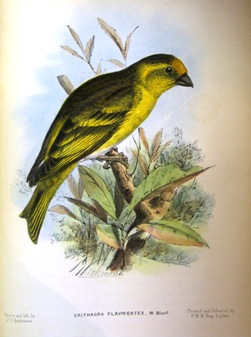
Observations on the geology and zoology of Abyssinia, made during the progress of the British expedition to that country in 1867-68 by W T Blanford. 1870.
Geoscientist 22.01 February 2012
Recently restored through the Library’s Sponsor a Book Appeal, W T Blanford’s Observations on the geology and zoology of Abyssinia is an account made during the British Army Expedition to rescue diplomats imprisoned in Magdala (now Amba Mariam, Ethiopia). Charting the voyage out of Bombay harbour (where Blanford was Deputy Superintendent of the Indian Survey) across the Gulf of Aden to the Red Sea, before the long ride inland across sandstone hills and enormous ravines, it is both a visually accurate description of the landscape and an engaging narrative of the thrills and challenges experienced on the journey.
The book is divided into three parts, with detailed and comprehensive sections on Geology and Zoology, complete with various illustrations of the expansive plateaux, military encampments and some beautifully coloured lithographs of birds (drawn by J G Keulemans). But it is Blanford’s Personal Account that is the most interesting, the geologist proving to be a charming narrator: wide-eyed and occasionally gung-ho with excitement, determined in his mission, precise in his descriptions. He revels at the fluke of shooting a hyena by moonlight or the long awaited discovery of some ‘oolithic fossils’; but he also notes the dangers of the trip, the loss of hundreds of pack mules, the servant killed by a leopard. Despite this, he writes: ‘I have never spent eight months more pleasantly. The country was most interesting, the climate during the greater part of the time perfect, and the fauna and geology had all the attractions of novelty’.
The Library thanks Dr Christopher Toland for his donation, which allowed us to conserve this title, which was re-sewn and preserved with its original cloth binding by Aquarius Book Restorers.
- The Library operates a sponsorship scheme to help preserve and restore its rare books. For more information, contact Michael McKimm in the library, or go to: www.geolsoc.org.uk/sponsorabook